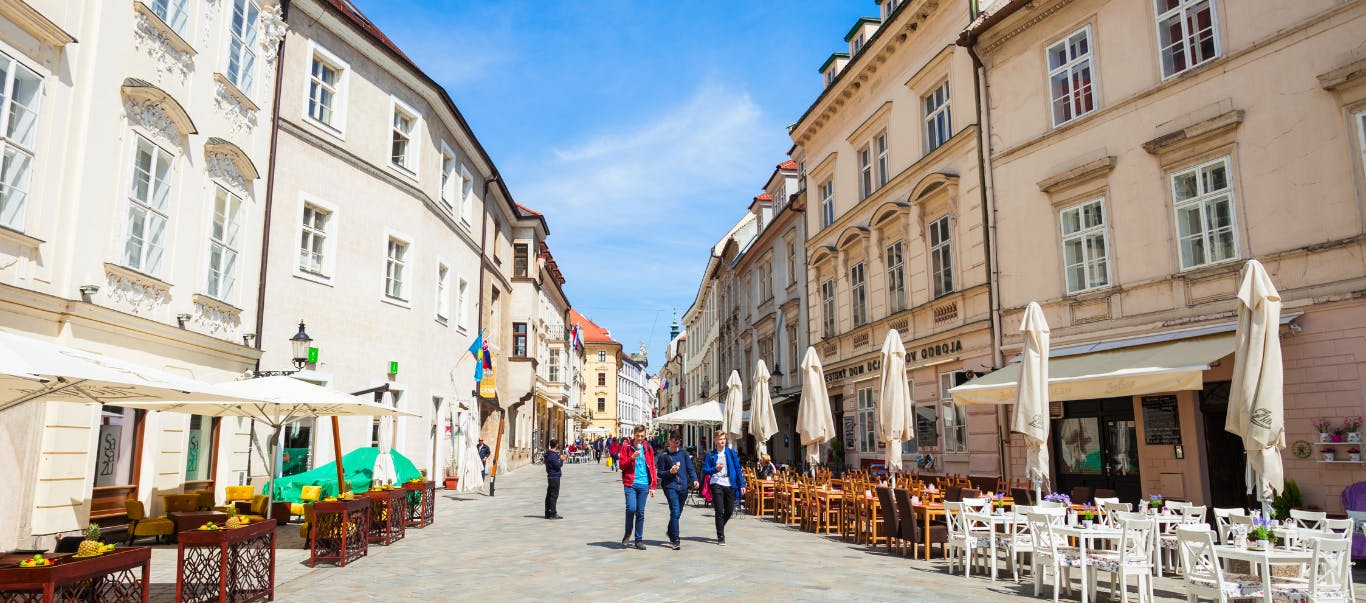
Trouver une offre
Some numbers



As a member of the Eurozone, Slovakia is an open economy, which is highly dependent on foreign investment and European markets. A production platform for European industries in the fields of automobiles and consumer electronics, it relies on a robust financial system but suffers from a shortage of skilled labour, high levels of unemployment and considerable inequalities in development.
Source: Country profile Business France
Good to know
Language spoken: Slovakian
Local currency: Euro
Capital: Bratislava
The conditions for undertaking a Business France V.I.E assignment in Slovakia
Do you meet the eligibility criteria for the V.I.E program and think you have the right profile?
Then take a look at the assignment conditions imposed by this country:

The conditions for undertaking a Business France V.I.A assignment in Slovakia
To go to Slovakia as a V.I.A young talent, you must fulfil the access conditions to the V.I.A program.
The administration that is recruiting you is responsible for your residence permit.
Still have questions? Feel free to contact us.
The cultural work codes in Slovakia
If there is one concept that characterises the working culture in Slovakia, it is professionalism. Indeed, Slovaks are known for their seriousness in the professional field. You must therefore emulate this quality in order to enjoy good relations with your colleagues. This professionalism requires, in particular, respect for punctuality and your appearance. Thus, to make a good impression, adopt a formal and neat dress code and you must without fail arrive at appointments on time.
To do business with Slovaks, you need to be patient because building relationships of trust can take some time. Friendly but reserved, they may be wary of you for fear of being taken advantage of. As a result, when living in Slovakia initial contact is often a test and rarely goes beyond polite exchanges. However, once you establish good relationships, Slovaks can exceed your expectations and be very co-operative.
To break the ice, take the time to discuss inconsequential topics. Knowing a few words of Slovak or complimenting your contact person on the beauty of the country will allow you to establish good foundations to then build a more advanced professional relationship. Afterwards, remember to formalise your exchanges with reports but also to be proactive. In fact, Slovaks are not used to chasing up their partners themselves. So don’t forget to show initiative to avoid losing a market or missing an opportunity.
Things that may surprise you in Slovakia
- Be careful when talking about the country’s history! Slovakia has been closely linked to the Czech Republic and Hungary, for better but also for worse. A long time a province of the Kingdom of Hungary and several times unified and separated from the Czech Republic, Slovakia has been completely independent since 1993. As a result, the subject of Czechoslovakia may be sensitive, it is better to avoid talking about it at the risk of making a blunder!
- You may be surprised by the local architecture, that fully reflects the country’s chequered past. Bratislava is thus a mixture of aesthetics and architectural eras, that are sometimes at complete odds with one another. As a result communist-era buildings co-exist with modern skyscrapers which results in a very striking result!
- Did you know - Slovakia has the highest number of castles per capita in the world! This is enough to keep lovers of historical and cultural heritage happy.
- Slovakian landscapes will take your breath away! Between plains and mountains, cities and countryside, wild nature and thermal springs, plus canyons, lakes and caves, there is plenty to do.
- Admittedly, the Slovaks are not very proficient at speaking English. This is even more true if you are talking to older generations. So choose German to communicate or just learn Slovak! Don’t be intimidated by the many consonants and accents in this language - learning a few useful Slovak words is worth it, if only to brighten up your colleagues’ day! The basic vocabulary includes : Dobré ráno (hello), Ako sa máš? (How are you ?) and Ďakujem (thank you).
- Since 2014, the national rail network has been completely free for children, students under 26, pensioners with disabilities or widows under 62 and people over 62. Provided, of course, that you are a citizen or permanent resident of Slovakia!
- The two main ingredients in Slovak cuisine are cabbages and potatoes, which are used in many recipes. Considered the national dish of Slovakia, Bryndzove halusky is a preparation of small gnocchi, sheep's cheese (bryndza) and bacon. Goulash and paprika are also an important part of Slovakian cuisine. You must also try Slovakian cheeses : bryndza - a fromage frais -, Korbáčiky smoked string cheese and Žinčica, a drink made from fermented milk.


